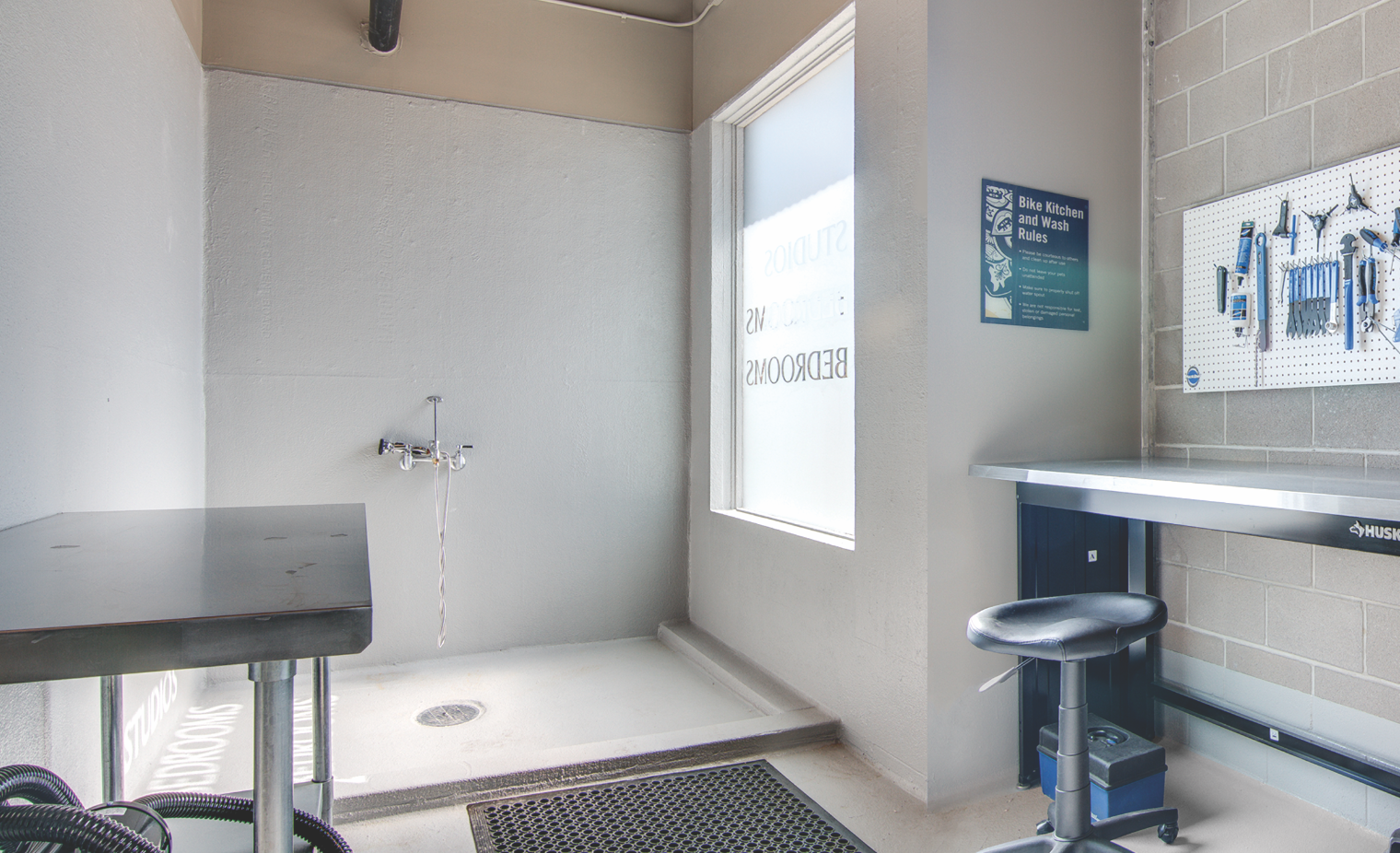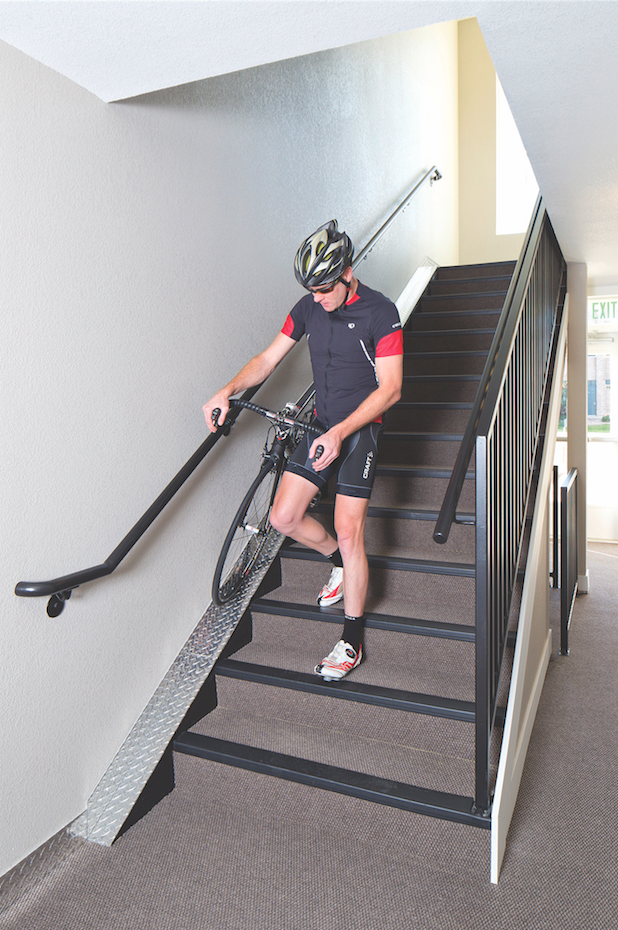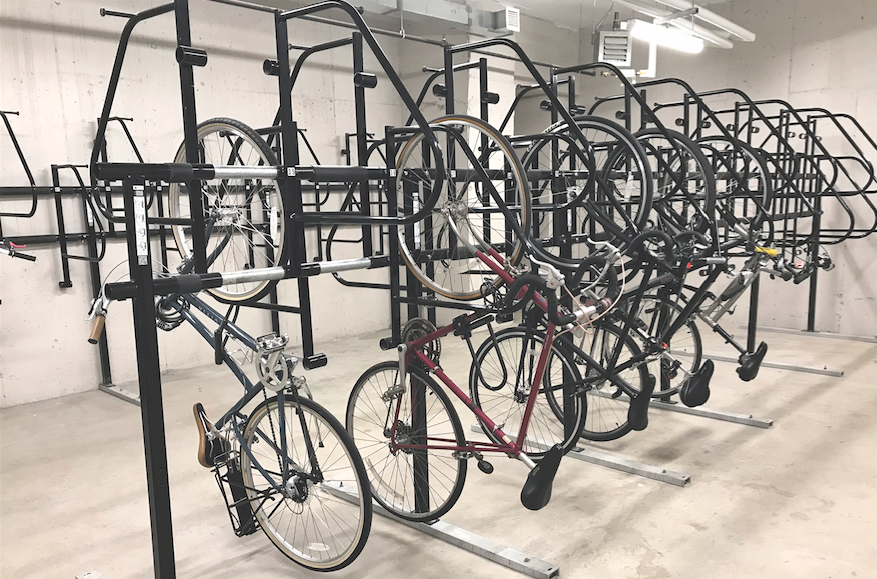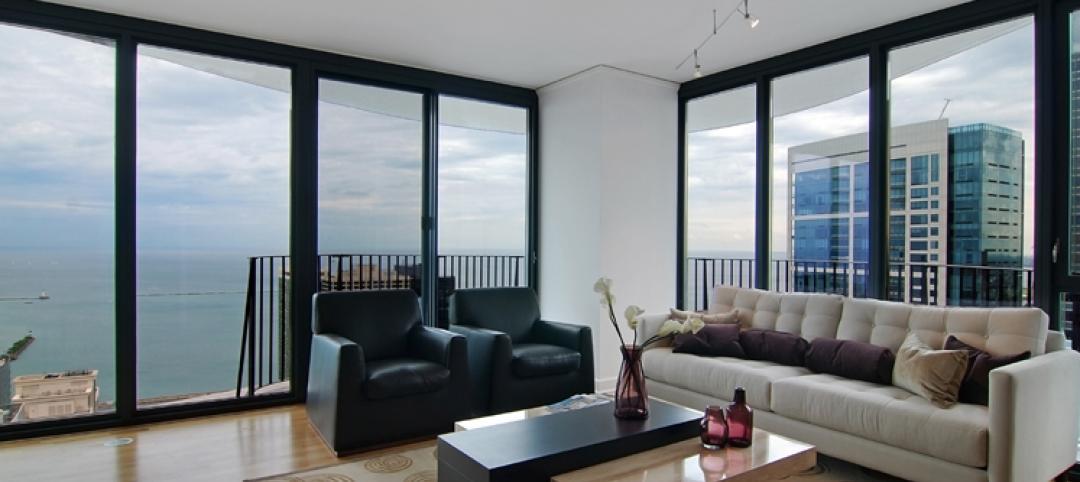Bicycling has become a preferred means of environmentally friendly, fun, and healthy transportation for millions of America’s apartment, condo, and townhouse dwellers.
From 2008 to 2017, bicycle ridership in the U.S. grew 40%, from 47 million to 66 million, according to Statistica.com. Couple the dramatic increase in cyclists with the fact that U.S. households are renting at higher rates than at any time in the past 50 years, and multifamily developers and their project teams are left with no choice but to include bicycle storage and maintenance high on their list of amenities.
In fact, this publication’s exclusive Multifamily Amenities 2017 survey (https://bit.ly/2eZMluw) found that two-thirds of respondents (66.5%) had included “secure bicycle storage” in recent projects.

A multifamily project designed by Denver architectural firm Kephart features a bicycle kitchen with an easily accessible wash station, work table, and workbench with tools for repairs and maintenance. Photo: Kephart
“Every project we design has bike storage of some type, whether it is standard racks on the street, individual private lockers, or hundreds of bikes stored in a stacker configuration in the parking garage,” said Nathan Sciarra, AIA, Associate Principal, KTGY Architecture + Planning, Denver.
Bicycle amenity spaces can be divided into three distinct types: storage only (bike parking, storage racks); bike storage with workshop space (pumps, basic tools, wash area); and the latest variant, bicycle kitchens (more intensive workshop areas combined with an added social element).
A bicycle kitchen is a luxury amenity that is very appealing to a growing group of multifamily dwellers. “I would describe them as bicycle clubhouses, where like-minded residents mingle, collaborate, share stories and adventures, and create connections,” said Bobby Long, Principal, Kephart. Considerable thought needs to go into the aesthetics and comfort of bicycle kitchens.
According to the design experts we consulted, there are certain features no bicycle kitchen should be without: large-screen TVs with cable service, WiFi, comfortable furniture that encourages gathering and relaxation, good lighting, and bicycle-themed artwork that brands the space. (One even has a sculpture made from bicycle parts.) No self-respecting cyclist wants to hang out in a poorly lit, uninviting, eldritch space reminiscent of the local auto shop.
Storage and workshop aspects cannot be ignored. Space for tools and repair equipment, storage racks with ample clearance for loading and unloading onto cars, accessory storage for helmets and bags, and an area for washing bikes must be accounted for.
Creating the perfect bicycle kitchen is all about finding the ideal balance between a workshop and a social space, said Jimmy Sinis, Senior Design Manager and Senior Associate, Stantec.
“Spaces like this foster a sense of community among residents,” said KTGY’s Sciarra. “To be considered a full bicycle kitchen, the design must incorporate comfortable seating, entertainment opportunities, and more. Then it’s more a kitchen than a repair space.”
Not every multifamily project needs a full bicycle kitchen, but bicycle storage of some kind has become a necessity for most new apartment and condo enterprises.
RATIOS, RATIOS, IT’S ALL ABOUT THE RATIOS
Then there are those pesky zoning requirements and resident-to-space ratios to consider. Having too little—or even too much—room can impair the functionality of bicycle storage areas.
In some jurisdictions, local zoning law dictates the required ratio of bike storage spaces to apartment units. Washington, D.C., requires one bike parking space for every three residential units (the same as LEED). Some designers feel that’s not enough bike storage space to meet residents’ expectations.

A metal ramp in a Boulder View (Colo.) community designed by KTGY Architecture + Planning runs along the edge of the stairs for easier shifting of bikes between floors. Photo: KTGY Architecture + Planning
According to Sciarra, the ideal ratio depends a lot on where the project is located. In urban areas with easy access to stores, restaurants, and entertainment venues, one bicycle space for every two units should work. (According to Ira Mitchneck, AIA, Senior Associate, New York–based Dattner Architects has found this ratio to work just fine in its projects, which are primarily in dense urban areas.) In suburban locations where more residents probably have a car, the ratio can be lowered to one storage space for every four or five units, said Sciarra.
Determining the best ratio of bike storage spaces to automobile parking spaces is more complicated. Miami’s zoning code, known as Miami 21, is a form-based system that relies on New Urbanism and Smart Buildings principles. It requires one bike storage space for every 20 parking spaces. Other jurisdictions allow for fewer vehicle parking spaces as the number of bike storage spaces increases.
“We don’t believe the correlation is that simple,” Sciarra said. “In our experience, the number of parking spaces and bike storage is driven more by location and the bike culture of that location.”
Kephart’s Long agrees. “I don’t think we’re looking at any specific ratios,” he said. “Each project is so specific, based on adjacency to bike lanes and paths and the specific bike culture.” Meaning whether—and how much—residents use their bikes for commuting, shopping, recreation, and physical training. “It’s certainly not a one-size-fits-all approach,” said Long.
Related Stories
| Aug 11, 2010
Bovis Lend Lease, Webcor among nation's largest multifamily contractors, according to BD+C's Giants 300 report
A ranking of the Top 50 Multifamily Contractors based on Building Design+Construction's 2009 Giants 300 survey. For more Giants 300 rankings, visit http://www.BDCnetwork.com/Giants
| Aug 11, 2010
Looney Ricks Kiss Architects wins industry honors for mixed-use, multifamily, and residential designs
Looney Ricks Kiss Architects won four Aurora Awards for its architectural designs during the recent Southeast Building Conference in Orlando, including a Grand Aurora Award for a Mixed Use Multi Family community located in the West Village area of Dallas.
| Aug 11, 2010
Jacobs, Arup, AECOM top BD+C's ranking of the nation's 75 largest international design firms
A ranking of the Top 75 International Design Firms based on Building Design+Construction's 2009 Giants 300 survey. For more Giants 300 rankings, visit http://www.BDCnetwork.com/Giants
| Aug 11, 2010
See what $3,000 a month will get you at Chicago’s Aqua Tower
Magellan Development Group has opened three display models for the rental portion of Chicago’s highly anticipated Aqua Tower, designed by Jeanne Gang. Lease rates range from $1,498 for a studio to $3,111 for a two-bedroom unit with lake views.
| Aug 11, 2010
Architecture Billings Index flat in May, according to AIA
After a slight decline in April, the Architecture Billings Index was up a tenth of a point to 42.9 in May. As a leading economic indicator of construction activity, the ABI reflects the approximate nine to twelve month lag time between architecture billings and construction spending. Any score above 50 indicates an increase in billings.
| Aug 11, 2010
Construction employment declined in 333 of 352 metro areas in June
Construction employment declined in all but 19 communities nationwide this June as compared to June-2008, according to a new analysis of metropolitan-area employment data released today by the Associated General Contractors of America. The analysis shows that few places in America have been spared the widespread downturn in construction employment over the past year.
| Aug 11, 2010
Jacobs, Hensel Phelps among the nation's 50 largest design-build contractors
A ranking of the Top 50 Design-Build Contractors based on Building Design+Construction's 2009 Giants 300 survey. For more Giants 300 rankings, visit http://www.BDCnetwork.com/Giants
| Aug 11, 2010
Arup, SOM top BD+C's ranking of the country's largest mixed-use design firms
A ranking of the Top 75 Mixed-Use Design Firms based on Building Design+Construction's 2009 Giants 300 survey. For more Giants 300 rankings, visit http://www.BDCnetwork.com/Giants








